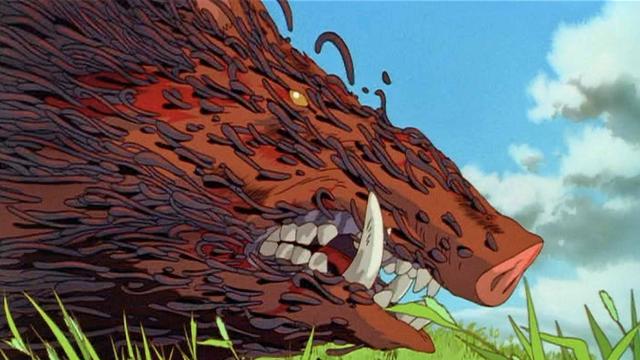In just a few weeks, the residents of a Fukushima city will finally be allowed to return to their homes. The trouble is, the place has been overrun by hundreds of belligerent and potentially radioactive wild boars, prompting public safety concerns.
Image: Princess Mononoke
At the end of March, the six-year-long evacuation order will be lifted for Namie, a city located just 4km from the damaged nuclear power plant. Radiation levels, now measured at 0.07 microsieverts an hour, are the same as they are in other areas of Japan. Namie is the closest area to the nuclear meltdown residents have been allowed to return to since the disaster on 11 March 2011, but the continued presence of wild boars in the region is making prospective homecomers nervous.
[referenced url=”https://gizmodo.com.au/2016/04/fukushimais-now-home-to-radioactive-wild-boars/” thumb=”https://i.kinja-img.com/gawker-media/image/upload/t_ku-large/o4obqx13nuczevewa8wa.jpg” title=”Fukushima Is Now Home To Radioactive Wild Boars” excerpt=”After a nuclear disaster, wildlife tends to flourish in contaminated areas, unchecked by humans that might otherwise hunt them. In the forests around Fukushima, the population of radioactive wild boars are exploding.”]
After the disaster, hundreds of wild boars descended onto previously populated areas of Fukushima, arriving from the nearby forests and hills. These animals, some of which came into contact with radioactive food, now roam Namie’s empty streets and overgrown backyards. In addition to being potentially contaminated, the animals are renowned for their bad tempers and willingness to confront humans.
“It is not really clear now which is the master of the town, people or wild boars,” noted mayor Tamotsu Baba in Reuters. “If we don’t get rid of them and turn this into a human-led town, the situation will get even wilder and uninhabitable.”
To address the problem, over a dozen hunters have been recruited to catch and kill the wild boars with air rifles, both in Namie and the other cities affected by the evacuation order. Twice a week, these hunters deploy 30 cage traps and use rice flour as bait. With no desire to relocate the animals, the hunters simply shoot the boars as they lie trapped in their cages.
“Wild boars in this town are not scared of people these days,” said hunter Shoichiro Sakamoto to Reuters. “They stare squarely at us as if saying, ‘What in the world are you doing?’ It’s like our town has fallen under wild boars’ control.”
Since last April, the hunters have disposed of 300 wild boars, but the work continues. Now reproducing with reckless abandon, the wild boar population has jumped 300 per cent since the disaster, reaching an estimated 13,000 individuals. The hunters will likely have to keep working to contain the animals even after the residents return to their homes.
According to Reuters, only half of Namie’s former 21,500 residents are planning to return, saying they’re worried about radiation and the condition of the nuclear plant. The presence of the boars isn’t helping matters. These animals can still wander into areas that are off limits to humans, and become contaminated with radiation. In the nearby town of Tomioka, which is also overrun by wild boars, radiation levels are at about 1.48 microsieverts an hour, which is nearly 30 times higher than what’s experienced in downtown Tokyo.
The boars, aside from their brazen behaviour, aren’t likely to pose a threat to Namie’s returning residents — that is, unless residents start to eat them (wild boar meat is quite popular in Japan). Some of these boars may have become contaminated with caesium-137 — a radioactive substance featuring a half-life of 30 years — by consuming plants and small animals within the radioactive exclusion zone.
For the foreseeable future, Fukushima’s wild boars will have to stay off the dinner table.
[Reuters]
